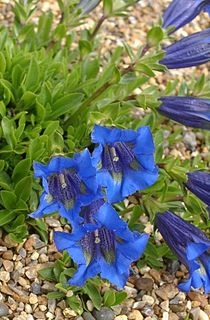
Gentianaceae is a family of flowering plants of 103 genera and about 1600 species.

Carl Ernst Otto Kuntze was a German botanist.
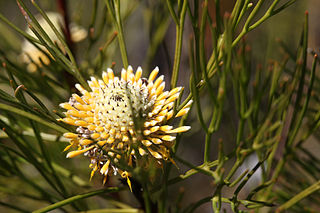
Isopogon anethifolius, commonly known as narrow-leaf drumsticks or narrow-leafed drumsticks, is a shrub in the family Proteaceae. The species is found only in coastal areas near Sydney in New South Wales, and to the immediate west. It occurs naturally in woodland, open forest and heathland on sandstone soils. An upright shrub, it can reach to 3 m (10 ft) in height, with terete leaves that are divided and narrow. The yellow flowers appear in the Spring, from September to December, and are prominently displayed. They are followed by round grey cones, which give the plant its common name of drumsticks. The small hairy seeds are found in the old flower parts.

Sesuvium portulacastrum is a sprawling perennial herb that grows in coastal areas throughout much of the world. It is commonly known as shoreline purslane or (ambiguously) "sea purslane," in English, and dampalit in Tagalog.
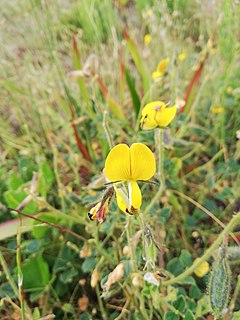
Bolusafra is a genus of flowering plants in the legume family, Fabaceae. It is monotypic, being represented by the single species Bolusafra bituminosa or tar pea.
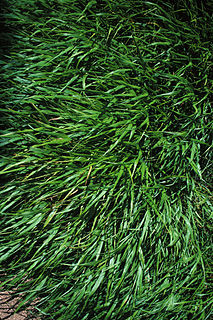
Hackelochloa is a genus of Asian and African plants in the grass family.

Isopogon ceratophyllus, commonly known as the horny cone-bush or wild Irishman, is a plant of the family Proteaceae that is endemic to the coast in Victoria, South Australia and on the Furneaux Group of islands in Tasmania. It is a small woody shrub that grows to 100 cm high with prickly foliage. It is extremely sensitive to dieback from the pathogen Phytophthora cinnamomi

Isopogon latifolius is a shrub of the family Proteaceae that is endemic to the southwest botanical province of Western Australia.

Paranomus is a genus of 18 species of flowering plants, commonly known as "sceptres", in the protea family. It is endemic to the Cape Floristic Region of South Africa.

Sparrmannia is an African genus of plants in the family Malvaceae.

Isopogon longifolius is a small shrub in the family Proteaceae that is endemic to the southwest of Western Australia.
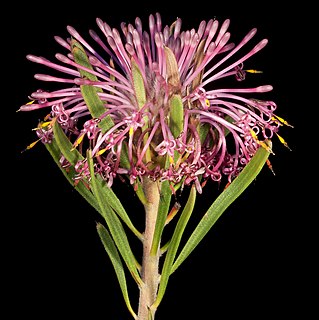
Isopogon linearis is a small shrub in the family Proteaceae that is endemic to the southwest of Western Australia.
Stillingia bodenbenderi is a species of flowering plant in the family Euphorbiaceae. It was originally described by Otto Kuntze as Sapium bodenbenderi in 1898. It is native to southeastern Brazil and northeastern Argentina.

Crossopetalum, commonly known as Christmas-berries or maiden berries, is a genus of flowering plants in the family Celastraceae. It comprises about 30-40 species.

Mesosphaerum is a genus of flowering plants in the family Lamiaceae, native to the New World Tropics and Subtropics. Two species, Mesosphaerum pectinatum and Mesosphaerum suaveolens, have been introduced to the Old World, with M. suaveolens found in the tropics of Africa, Asia and Australia.
Thesium linophyllon is a species of flowering plant belonging to the family Santalaceae.
Arthraerua is a genus of flowering plants belonging to the family Amaranthaceae.
Beccarinda is a genus of flowering plants belonging to the family Gesneriaceae.
Bisboeckelera is a genus of flowering plants belonging to the family Cyperaceae.
Bouchea is a genus of flowering plant belonging to the family Verbenaceae.













